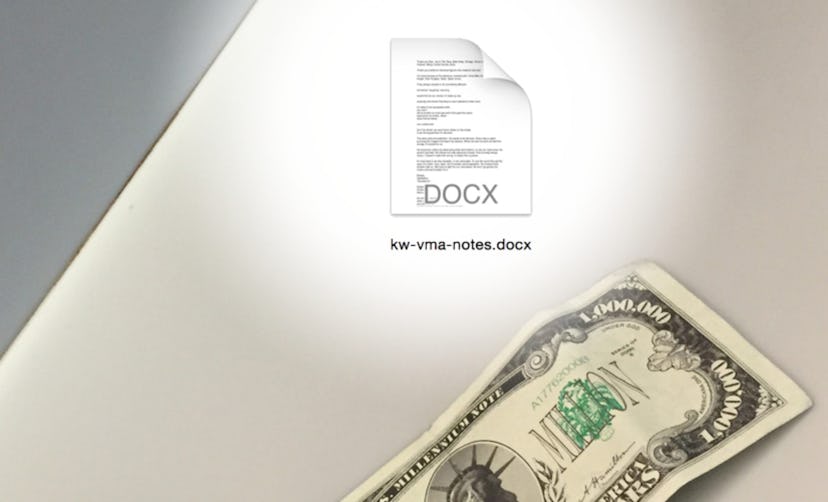Would You Pay $300 For Artists’ Computer Files?
Badlands Unlimited is offering a series of downloadable files composed by artists for $150 to $300 dollars.

Visual art meant to be distributed on the internet, a.k.a. net art, has traditionally been free to view. Just click a link and it’s yours to behold.
Well, Badlands Unlimited thinks that just because an artist chooses computer files as a medium, it doesn’t mean that there shouldn’t be a commercial market for that work. The New York-based art imprint has introduced Files, a new series of three works for sale that are, well, basically just downloadable files.
“Using a computer, artists now print paintings, extrude sculptures with (probably toxic) plastic compounds, even automate entire performances from a laptop. But whatever the form the work finally takes, it was first and foremost a file: a digital document that the artist created in order to control and direct the devices at her disposal,” says Badlands Unlimited’s website. “Artists using technology are all, in this regard, filemakers.”
Here’s the breakdown on the three works:
Cory Arcangel‘s “Jabber.pl (2006, Perl script, 5 KB),” which is for sale for $250.00. This is an incomplete programming script for the Jabber chatroom service. Completing the program is up to the buyer, but if they do they’ll digitally conger up a chatroom in which avatars of three characters from the film Easy Rider exchange lines from the movie.
“Whether you take on the challenge of finally creating the chat room, or you absorb the formal beauties of the code itself, Jabber.pl will never stop asking what freedom really is,” says the descriptions.
Paul Chan‘s “Politics To Come (2005, Truetype font, 373 KB)”, which is for sale for $300.00 Chan has created a font that references classical typefaces like Times New Roman and Cambria. The main difference is that every time you press a key the computer types the word “blah.”
“Using the font is an art performance on its own; the process of reading and writing both take on psychosocial significance,” claims the description.” When reading a text set to Politics to Come, the stroke of each letter transforms the most rending rhetorical styles into the soft drone of a Woolfian interior monologue.”
Martine Syms’s “Notes toward a Kanye West VMA visionary award acceptance speech (2015, Microsoft Word document, 118 KB)” which is for sale for $150. Syms claims to have helped Kanye West draft the 11-minute speech he gave at the 2015 VMAs (the one where he ended up announcing his 2020 presidential run), and says these are the notes she took during the process in Microsoft Word format.
The description, otherwise, is the most cryptic of the three with the gallery only claiming that the work is “disjointed and repetitious, sometimes achieving, sometimes falling short of inspiration, these notes provide some inkling into West’s thought process, as he touts his clout and apologizes to Taylor.”
It’s easy to scoff at the idea of paying hundreds of dollars for computer files, but the gallery understands that offering this type of work up for sale in this particular way is in a sense an artistic statement in itself.
“Badlands envisions Files as a new and novel way for enthusiasts, collectors, and institutions of contemporary art to support artists by collecting and preserving the files that enable their work to appear and thrive” says the press release. “Start your collection of artist files today.”
In this way the project leaps forward to a conversation that we’ll inevitably have in the future. Important artist’s sketches, personal letters, and other personal artifacts can be collected with the same intensity of their actual work, and are housed at museums, libraries and in personal collections. Modern artists, thanks to technology, will not leave behind as much of a material (and hence collectible) trail thanks to computers and smartphones.
The New York Public Library currently holds a collection of letters written by some of the preeminent artists of the 19th and 20th centuries. Will someday a library collect (and pay for) a curated selection of today’s artist’s text messaging and Tweets? Files takes a step to possibly answering that.